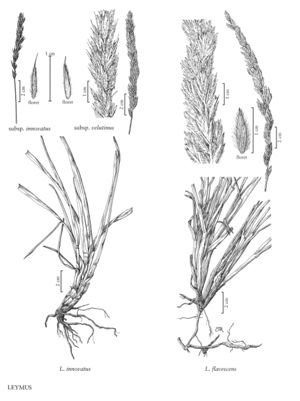familyPoaceae
subfamilyPoaceae subfam. Pooideae
genusLeymus
speciesLeymus innovatus
subspeciesLeymus innovatus subsp. innovatus
Difference between revisions of "Leymus innovatus subsp. innovatus"
Treatment appears in FNA Volume 24. Treatment on page 366.
FNA>Volume Importer |
FNA>Volume Importer |
||
| Line 15: | Line 15: | ||
-->{{Treatment/Body | -->{{Treatment/Body | ||
| − | |discussion=<p>Leymus innovatus subsp. innovatus is the more widespread of the two subspecies, extending across North America from the southern Yukon Territory to Ontario, south in the Rocky Mountains to northern Montana, and, as a disjunct, to the Black Hills region of Wyoming and South Dakota. Closer study is needed to determine its range more exactly.</p> | + | |discussion=<p><i>Leymus innovatus </i>subsp.<i> innovatus</i> is the more widespread of the two subspecies, extending across North America from the southern Yukon Territory to Ontario, south in the Rocky Mountains to northern Montana, and, as a disjunct, to the Black Hills region of Wyoming and South Dakota. Closer study is needed to determine its range more exactly.</p> |
|tables= | |tables= | ||
|references= | |references= | ||
| Line 35: | Line 35: | ||
|publication year= | |publication year= | ||
|special status= | |special status= | ||
| − | |source xml=https://jpend@bitbucket.org/aafc-mbb/fna-data-curation.git/src/ | + | |source xml=https://jpend@bitbucket.org/aafc-mbb/fna-data-curation.git/src/8f726806613d60c220dc4493de13607dd3150896/coarse_grained_fna_xml/V24/V24_528.xml |
|subfamily=Poaceae subfam. Pooideae | |subfamily=Poaceae subfam. Pooideae | ||
|tribe=Poaceae tribe Triticeae | |tribe=Poaceae tribe Triticeae | ||
Revision as of 17:20, 18 September 2019
Spikes 8-16 cm long, 8-15 mm wide. Glumes present; lemma hairs 0.7-2.5 mm. 2n = 28.
Discussion
Leymus innovatus subsp. innovatus is the more widespread of the two subspecies, extending across North America from the southern Yukon Territory to Ontario, south in the Rocky Mountains to northern Montana, and, as a disjunct, to the Black Hills region of Wyoming and South Dakota. Closer study is needed to determine its range more exactly.
Selected References
None.
Lower Taxa
None.
